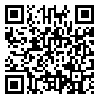Volume 12, Issue 44 (Spring 2018)
MLJ 2018, 12(44): 77-94 |
Back to browse issues page
Download citation:
BibTeX | RIS | EndNote | Medlars | ProCite | Reference Manager | RefWorks
Send citation to:



BibTeX | RIS | EndNote | Medlars | ProCite | Reference Manager | RefWorks
Send citation to:
Gholami N, Abbasi M, Soltani Kuhbanuni S. Insanity Concept in Islamic Punishment Law: Subjectivism or Objectivism. MLJ 2018; 12 (44) :77-94
URL: http://ijmedicallaw.ir/article-1-858-en.html
URL: http://ijmedicallaw.ir/article-1-858-en.html
1- Faculty of Law and Political Science, Allameh Tabataba'i University, Tehran, Iran. (Corresponding author)
2- Medical Ethics and Law Research Center, Shahid Beheshti University of Medical Sciences and Health Services, Tehran, Iran
3- Department of Educational Sciences, Educational sciences & Psychology Faculty, Ferdowsi University of Mashhad (FUM), Mashhad, Iran
2- Medical Ethics and Law Research Center, Shahid Beheshti University of Medical Sciences and Health Services, Tehran, Iran
3- Department of Educational Sciences, Educational sciences & Psychology Faculty, Ferdowsi University of Mashhad (FUM), Mashhad, Iran
Abstract:
Subjectivism or Objectivism of insanity, as one of the eliminators of criminal responsibility, are challenges under attention regarding the psychotherapy findings about the criminal responsibility of the lunatics. The difference between the two is that if insanity has subjectivism to eliminate criminal responsibility, its authentication by judicial authority leads to eliminate the criminal responsibility from the person. But if Objectivism accepted for insanity, it is eliminator of criminal responsibility only when the person's insanity causes disruption in cognition. Consideration of each perspective according to Iran's lawmaker view has especial consequences in criminal responsibility of the lunatics which is discussed in this paper. Therefore, this study aims at determining subjectivity or Objectivity of insanity in Iran's criminal law and the main question of this study is designed as follow: according to Iran's criminal law, insanity for disclaiming from crime committed, contains subjectivity or Objectivity? In this study using analytic-descriptive method and Iran's judicial procedure, such a conclusion is reached that although the main perspective of lawmaker shows insanity results in criminal disclaiming when it terminates will or distinguishing power (Objectivity of insanity). However, writing way of article 149 of the Islamic punishment law (1392) results in Inferring subjectivity of insanity for criminal disclaiming.
Please cite this article as: Gholami N, Abbasi M, Soltani Kuhbanuni S. Insanity Concept in Islamic Punishment Law: Subjectivism or Objectivism. Iran J Med Law 2018; 12(44): 77-94.
Please cite this article as: Gholami N, Abbasi M, Soltani Kuhbanuni S. Insanity Concept in Islamic Punishment Law: Subjectivism or Objectivism. Iran J Med Law 2018; 12(44): 77-94.
Type of Study: Original Article |
Received: 2017/01/30 | Accepted: 2017/12/6
Received: 2017/01/30 | Accepted: 2017/12/6
Send email to the article author
| Rights and permissions | |
 |
This work is licensed under a Creative Commons Attribution-NonCommercial 4.0 International License. |





